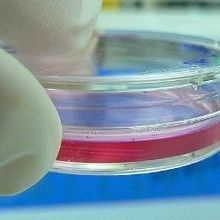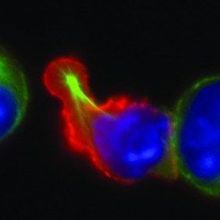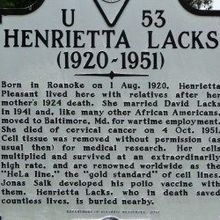cell line

Developing a Protocol for Generating Genetically Modified NK Cells
Thermo Fisher Scientific | Jan 8, 2024 | 1 min read
Natural killer (NK) cells target infected and oncogenic cells, but are difficult to work with in vitro. Discover novel approaches to producing genetically modified NK cells for cell therapy.

Stem Cell Lines Riddled With Undetected Mutations
Dan Robitzski | Aug 12, 2022 | 4 min read
Most of the human induced pluripotent stem cells stored at major cell line repositories and used in research harbor thousands of DNA errors, a study finds, highlighting the need for improved quality control measures.

Underdog Enzyme Likely Responsible for Mutations in Most Cancers
Sophie Fessl, PhD | Jul 28, 2022 | 3 min read
A previously overlooked enzyme called APOBEC3A is linked to the most prevalent mutational signatures in cancer cell lines, a study finds.

Are Your Cell Lines What You Think They Are?
MilliporeSigma | Mar 29, 2022 | 1 min read
Learn how to identify contamination and authenticate your cell lines.

Why Might Cells Die or Fail to Thrive in Culture?
MilliporeSigma | Mar 29, 2022 | 1 min read
Learn more about cell culture best practices.

Henrietta Lacks Estate Sues Thermo Fisher over HeLa Cell Line
Catherine Offord | Oct 4, 2021 | 3 min read
Attorneys for the family seek compensation for the company’s sale of cells cloned from tissue removed without consent by doctors at Johns Hopkins Hospital 70 years ago.

Wellcome Sanger Institute to Close Animal Facility
Chia-Yi Hou | Jun 10, 2019 | 1 min read
The move reflects scientists using more cell lines and organoids in genetic research, although some experts disagree with the decision to scale back the use of animal models.

HeLa Cells from Different Labs Vary in Genetics, Phenotype
Katarina Zimmer | Feb 26, 2019 | 4 min read
This could account for some reproducibility problems in cell line research, according to the authors of a comprehensive analysis of HeLa variants.

Scientists Raise Concerns About Revisions to Human Research Regulations
Katarina Zimmer | Feb 19, 2019 | 6 min read
Authors of a new paper take issue with revisions to regulations on biospecimen research enacted last month, and argue that cell lines should be treated differently from other biospecimens.

Image of the Day: Eye-Opener
Sukanya Charuchandra | Jul 17, 2018 | 1 min read
An open-source microscopy method can super-resolve live cells even under low lighting.

Roland Nardone, Advocate for Cell-Line Authentication, Dies
Kerry Grens | Jul 11, 2018 | 2 min read
The Catholic University of America professor was also known for his summer workshops on the latest techniques.

One Way to Fix Reproducibility Problems: Train Scientists Better
Katarina Zimmer | Nov 28, 2017 | 4 min read
Leonard Freedman, president of the Global Biological Standards Institute, discusses the causes of irreproducible science and his latest effort to spread best practices.

Papers Based on Misidentified Cell Lines Top 32,000
Kerry Grens | Oct 16, 2017 | 1 min read
An analysis of contaminated literature finds that tens of thousands of papers used cell lines of questionable origins—and these were in turn cited by hundreds of thousands of other papers.

The Ever-Expanding T-Cell World: A Primer
Ashley P. Taylor | Aug 7, 2017 | 8 min read
Researchers continue to identify new T-cell subtypes—and devise ways to use them to fight cancer. The Scientist attempts to catalog them all.

New Resource for Banked iPSCs
Aggie Mika | May 11, 2017 | 1 min read
Researchers describe hundreds of induced pluripotent stem cell lines from healthy individuals.

Cell Lines Gain Cancer-Related Mutations
Kerry Grens | Apr 27, 2017 | 1 min read
A screen of human embryonic stem cell lines finds several that accumulated changes in the gene TP53, including aberrations commonly seen in cancer.

Henrietta Lacks’s Family Seeks Compensation
Kerry Grens | Feb 15, 2017 | 1 min read
Family members of Lacks, the donor behind the widely used HeLa cell line, are planning to sue Johns Hopkins University.

Popular Tumor Cell Line Contaminated
Kerry Grens | Aug 31, 2016 | 2 min read
A commercially available glioblastoma cell line appears to be from a different source than its stated origins.

Scientists Skip Cell Line Validation
Kerry Grens | Oct 12, 2015 | 1 min read
Despite known problems with contamination and mislabeled cell lines, most researchers continue to operate without authenticating cells’ identity.
